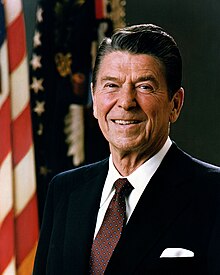
Patrick Joseph Buchanan is an American paleoconservative political commentator, columnist, politician, and broadcaster. Buchanan was an assistant and special consultant to U.S. Presidents Richard Nixon, Gerald Ford, and Ronald Reagan. He is a major figure in the modern paleoconservative movement in America, and his writings, morals, values, and strategic thinking have continued to influence many paleoconservatives.
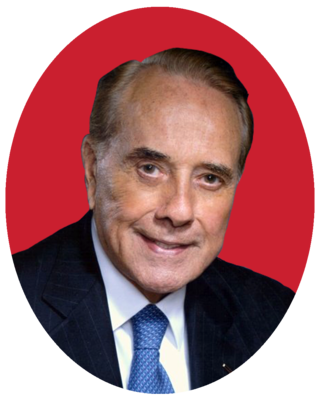
The 1996 Republican National Convention convened at the San Diego Convention Center (SDCC) in San Diego, California, from August 12 to August 15, 1996. The convention nominated former Senator Bob Dole from Kansas, for president and former Representative and secretary of Housing and Urban Development Jack Kemp, from suburban Buffalo, New York, for vice president.
The effect of legalized abortion on crime is a controversial hypothesis about the reduction in crime in the decades following the legalization of abortion. Proponents argue that the availability of abortion resulted in fewer births of children at the highest risk of committing crime. The earliest research suggesting such an effect was a 1966 study in Sweden. In 2001, Steven Levitt of the University of Chicago and John Donohue of Yale University argued, citing their research and earlier studies, that children who are unwanted or whose parents cannot support them are likelier to become criminals. This idea was further popularized by its inclusion in the book Freakonomics, which Levitt co-wrote.

John Phillips Avlon is an American journalist and political commentator. He is a Senior Political Analyst and anchor at CNN and was the editor-in-chief and managing director of The Daily Beast from 2013 to 2018. Avlon was previously a columnist and associate editor for The New York Sun and chief speechwriter for former Mayor of New York City Rudy Giuliani.

In political studies, surveys have been conducted in order to construct historical rankings of the success of the presidents of the United States. Ranking systems are usually based on surveys of academic historians and political scientists or popular opinion. The scholarly rankings focus on presidential achievements, leadership qualities, failures and faults. Popular-opinion polls typically focus on recent or well-known presidents.

Freakonomics: A Rogue Economist Explores the Hidden Side of Everything is the debut non-fiction book by University of Chicago economist Steven Levitt and New York Times journalist Stephen J. Dubner. Published on April 12, 2005, by William Morrow, the book has been described as melding pop culture with economics. By late 2009, the book had sold over 4 million copies worldwide. Based on the success of the original book, Levitt and Dubner have grown the Freakonomics brand into a multi-media franchise, with a sequel book, a feature film, a regular radio segment on National Public Radio, and a weekly blog.

Emily Fair Oster is an American economist and author. She is currently the JJE Goldman Sachs University Professor of Economics and International and Public Affairs at Brown University, where she has taught since 2015. Her research interests span from development economics and health economics to research design and experimental methodology. Her research has received exposure among non-economists through The Wall Street Journal, the book SuperFreakonomics, and her 2007 TED Talk.

Charleston, South Carolina, was a hotbed of secession at the start of the American Civil War and an important Atlantic Ocean port city for the fledgling Confederate States of America. The first shots against the Federal government were those fired there by cadets of the Citadel to stop a ship from resupplying the Federally held Fort Sumter. Three months later, the bombardment of Fort Sumter triggered a massive call for Federal troops to put down the rebellion. Although the city and its surrounding fortifications were repeatedly targeted by the Union Army and Navy, Charleston did not fall to Federal forces until the last months of the war. Charleston was devastated.
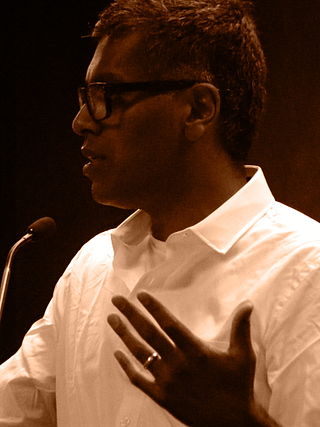
Sudhir Alladi Venkatesh is an American sociologist and urban ethnographer. He is William B. Ransford Professor of Sociology & African-American Studies at Columbia University, a position he has held since 1999. In his work, Venkatesh has studied gangs and underground economies, public housing, advertising and technology. As of 2018, he is the Director of Signal: The Tech & Society Lab at Columbia University.

The presidency of James Buchanan began on March 4, 1857, when James Buchanan was inaugurated as 15th president of the United States, and ended on March 4, 1861. Buchanan, a Democrat from Pennsylvania, took office as the 15th United States president after defeating former President Millard Fillmore of the American Party, and John C. Frémont of the Republican Party in the 1856 presidential election.

Elitism is the belief or notion that individuals who form an elite—a select group of people perceived as having an intrinsic quality, high intellect, wealth, power, notability, special skills, or experience—are more likely to be constructive to society as a whole, and therefore deserve influence or authority greater than that of others. The term elitism may be used to describe a situation in which power is concentrated in the hands of a limited number of people. Beliefs that are in opposition to elitism include egalitarianism, anti-intellectualism, populism, and the political theory of pluralism.
The Emotional thought method develops a group of activities that can be used in a personal or group-oriented way. This method concerns developing Emotional intelligence in a similar way that Daniel Goleman (1995) proposed in his book Emotional intelligence, a bestseller book written in 1995.

James Buchanan Jr. was an American lawyer, diplomat and politician who served as the 15th president of the United States from 1857 to 1861. He previously served as secretary of state from 1845 to 1849 and represented Pennsylvania in both houses of the U.S. Congress. He was an advocate for states' rights, particularly regarding slavery, and minimized the role of the federal government preceding the Civil War. Buchanan was the last president born in the 18th century.
James C. Humes was an author and former presidential speechwriter.
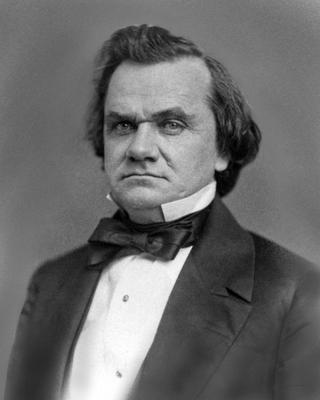
Stephen Arnold Douglas was an American politician and lawyer from Illinois. A senator, he was one of two nominees of the badly split Democratic Party for president in the 1860 presidential election, which was won by Republican Abraham Lincoln. Douglas had previously defeated Lincoln in the 1858 United States Senate election in Illinois, known for the pivotal Lincoln–Douglas debates. He was one of the brokers of the Compromise of 1850 which sought to avert a sectional crisis; to further deal with the volatile issue of extending slavery into the territories, Douglas became the foremost advocate of popular sovereignty, which held that each territory should be allowed to determine whether to permit slavery within its borders. This attempt to address the issue was rejected by both pro-slavery and anti-slavery advocates. Douglas was nicknamed the "Little Giant" because he was short in physical stature but a forceful and dominant figure in politics.
Alvin S. Felzenberg is an American author, columnist, consultant, educator, historian, public official, and spokesperson. A resident of Palm Beach, Florida and Washington, D.C., he served with the 9/11 Commission and has written books on American history and biography, with some of his best known being studies of the country's presidents, such as A Man and His Presidents: The Political Odyssey of William F. Buckley, Jr. and The Leaders We Deserved. He has been a professor at The University of Pennsylvania. He is a political conservative who considers Ronald Reagan a "great" president who "belongs on Mount Rushmore."
Yvonna Sessions Lincoln is an American methodologist and higher education scholar. Currently a Distinguished Professor of Higher Education and Human Resource Development at Texas A&M University in College Station, Texas, Lincoln holds the Ruth Harrington Endowed Chair of Educational Leadership. As an author, she has been largely collected by libraries.

New York real estate magnate Donald Trump announced the creation of a presidential exploratory committee on the October 7, 1999, edition of Larry King Live on CNN. Although Trump had never held elected office, he was well known for his frequent comments on public affairs and business exploits as head of The Trump Organization. He had previously considered a presidential run in 1988 as a Republican, but chose not to run. For 2000, Minnesota Governor Jesse Ventura persuaded Trump to seek the presidential nomination of the Reform Party, which was fracturing despite achieving ballot access and qualifying for matching funds as a result of businessman Ross Perot's 1996 presidential campaign on the party's ticket.
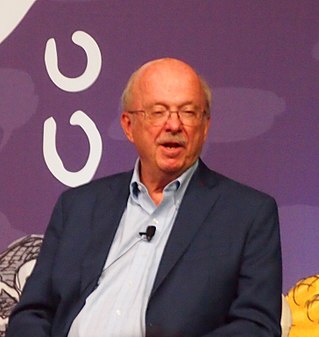
Ronald C. "Ron" White is an American historian, author, and lecturer. He has written bestselling and award-winning biographies and books on Abraham Lincoln and Ulysses S. Grant. He is a senior fellow at the Trinity Forum.
Recarving Rushmore: Ranking the Presidents on Peace, Prosperity, And Liberty is a non-fiction book authored by American socio-political commentator Ivan Eland. Published in 2009 by the Independent Institute, the book reviews the history of the United States with a particular emphasis on that of the presidents who have led the nation. Taking issue with previous accounts in which historians have ranked the officials, the author applies his libertarian approach in terms of using different criteria to judge the men.

